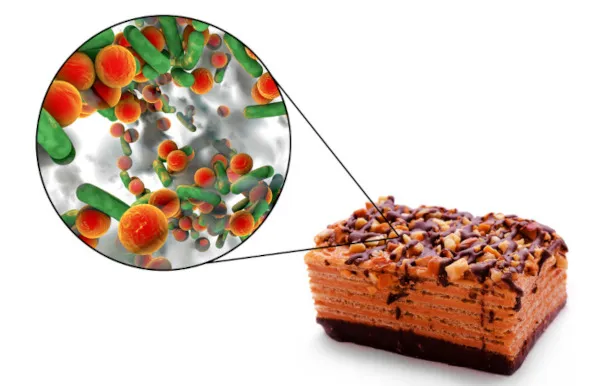Usually when we get out of our routine, we go on a trip or celebrate something, we choose to eat something different, or in the rush of everyday life, something from the street. But depending on what you eat, it can ruin your trip and your day.
So let's share with you care to avoid food poisoning.
Symptoms of food poisoning
Usually the most common symptoms are: fever, headache, general malaise, stomach pain, dehydration, vomiting and nausea.
What are the causes of food poisoning?
The causes of food poisoning are related to the ingestion of food or water contaminated by viruses, toxins, parasites or bacteria.
The most common are Salmonella Escherichia coli and Rotavirus.
Generally, this contamination occurs due to poor storage or incorrect handling of food, without attention to hygiene practices.

What kind of food can cause food poisoning?
Foods that need cooking above 70ºC such as beef, pork, raw or undercooked eggs, seafood, unfiltered water, “cow” milk that has not been boiled (not pasteurized) and poorly sanitized vegetables.
In addition to these, there are expired foods sold for consumption, especially meat, foods preserved at a temperature (generally above) the temperature allowed for their conditioning, in this case street foods, fast food stalls, pastries and all foods in this segment (coxinha, risolhes, wraps...), among others.
For these millions of reasons, you need to be very careful where you buy your food and how you preserve it, the problem is not just on the street and restaurants, but also indoors.
Have you ever thought about taking your dream trip and eating some spoiled food, or something that is contaminated?!
How to treat food poisoning?
The treatment can be the simplest, as it usually happens, with a lot of water intake to hydrate the body.
However, if you are feeling very weak, the ideal is to go to an emergency room and see if there is a need to take any intravenous medication, such as serum.
exogenous intoxication
The exogenous intoxication caused by the external contact with chemical substances that harm people's bodies, which can cause serious damage and even death.
An example is hospital infections, infections that are in the hospital environment and the person can be contaminated, leading to death.
Ways to avoid food poisoning while traveling
You can hesitate, but of course all of us won't be 100% safe, but let's go for the tips:
- drink bottled water, no consume directly from the tap;
- consume a lot of water;
- avoid eating food on the street such as pastries, risolhes, meat skewers, etc.;
- when preparing your food, wash the leaves and fruits very well;
- wash your hands well;
- be careful with foods you've never tasted, read a little about them and when in doubt: don't consume!
Read too:
